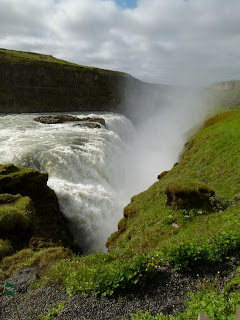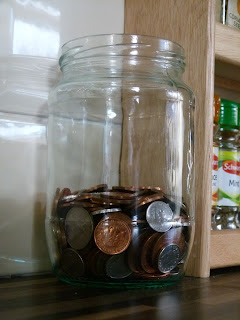I only really planned the beginning and very end of the trip, so here goes.
The Maritimes
1. Nova Scotia
Man, I had huge plans for Nova Scotia - Bay of Fundy, Lunenburg, Joggins... I only ended up spending about 5 days in the province, courtesy of ending up an a very short notice road trip with a fellow Brit I met on the first day. I did get to explore a bit of Halifax and I did see the Bay of Fundy and whales in it to boot. Didn't see much else of the province though.2. Newfoundland
I would have loved to visit Newfoundland. However, while getting there would have been easy enough - ferry from Nova Scotia - getting around once I got there would have proved difficult and expensive. So Newfoundland will have to wait for now. I need someone who can drive...3. New Brunswick
Not really part of my original plan, but I did end up spending a couple of days there. Admittedly, I spent that time mostly in the hostel (because it was raining) or in the station (because, woo, midnight train). Hmm...4. Prince Edward Island
I'd not planned on visiting because I "didn't want to rush myself". Out of all of the maritime provinces, this is probably the place I felt least rushed. I spent nearly 3 days there, enjoying how quiet it was even despite the kitschy madness of Green Gables.Quebec
5. Quebec City
I'd originally only planned on a week in Quebec province, but after rushing through the Maritimes in just over a week, I was ready to slow down. Which meant I ended up spending 4 days in beautiful Quebec City instead of the day or 2 I'd originally thought. As a result, I had much more time to go exploring the city's history. Great stuff.6. Montreal
I spent 5 days in Montreal, the longest I'd stayed anywhere since I left Iceland. It would prove to be the beginning of a pattern - 4-5 day stays became my default as much as possible for the rest of my time in Canada. I'm glad I slowed down so much - Montreal had plenty to offer, even if it did rain some more.7. Outdoorsy things
Yeah. I didn't end up doing any of those in Quebec. Getting caught outside in a torrential downpour doesn't count.Ontario and the prairies
I didn't actually plan anything for this, really. I mostly just pootled through the big cities (Ottawa, Toronto) and revisited places from my previous trip (Kingston, Niagara, Hamilton). More on that in a bit.As for the prairies, I hadn't really planned on anything there. I knew I wanted to take the train across from Toronto to Vancouver, but originally I was going to go non-stop. I decided 4 days on a train didn't sound like fun (says the girl who just booked a 51 hour bus journey), so I ended up stopping in Winnipeg and Edmonton and I'm very glad I did. Both cities just a little bit off the main tourist trail, but well worth visiting.
Vancouver and the Rockies
8. Vancouver Island
Yeah. That didn't happen. By the time I arrived in Vancouver I wasn't really in the mood for doing anything much. Despite breaking up my train journey, those nights trying to sleep on the train really seemed to screw with my brain.9. Capilano Suspension Bridge
This did happen though. Success!!10. Lake Louise
This also happened. It rained quite a bit and a big fucking bear scared the shit out of us at the campground, but we did see Lake Louise.11. Burgess Shale
Didn't happen. We drove past it. And past the turn off for the Stanley Glacier trail, which runs past another outcrop of the same fossil-bearing shale. I made do with a few random museumm exhibits and the faint hope of spotting a fossil at Marble Canyon.12. Riding, rafting, kayaking
Wow, I had all the outdoors things in mind for the Rockies. And we managed most of them (and more). Ziplining, canoeing, rafting, riding, bobsleigh (yes, bobsleigh). Plus a whole bunch of really nice walks. Success on that count.13. Head-Smashed-In Buffalo Jump
This is a World Heritage Site south of Calgary and ultimately turned out to be just a bit too far out of the way. A shame, but it'll have to wait for another trip.On first glance, it looks like I missed out on a lot of the things I originally planned or wanted to do. But I also did a lot more that I didn't intend. I took a road trip with someone I'd only just met and anyone who knows me will probably understand that that's quite a big deal for me. My time in Canada, while obviously amazing and great fun, also proved to me that I can deal with social situations and I can actually hold a conversation with people I don't know. It's lovely.
Now, things to bear in mind for anyone wanting to repeat the above. Because clearly everyone wants to take 2 months to travel Canada.
1. Canada is huge
Yes, I know this should be obvious, but it's worth mentioning. Getting around can take hours or even days unless you're going to focus on just a little bit of the country. A bus from the capital in Ottawa to Toronto takes about 3 hours. A train from Campbellton, New Brunswick to Quebec City takes 8 hours. And a train across from Vancouver to Toronto takes 4 days.Yup. Huge. Maybe just focus on an area - Ontario around Toronto or Quebec & Montreal are probably good ideas.
2. Inter-city buses are pretty good
Greyhound's network runs from Ontario across to British Columbia. East of that connections are run by smaller provincial companies. Getting between the big cities is pretty easy and it's even possible to get a bus from Toronto out west to at least Calgary - I know, I met someone taking it. It took her 3 days.3. Canadians really are friendly
I know it's a stereotype, but I've found it to be true. From the helpful attendant on the Toronto subway to the chap who parked the RV for us the first night we had it, the stereotype has held true and it's been absolutely lovely.4. It's worth brushing up on French
I thought I would be all right in Quebec, Canada's French-speaking province - I learned a bit of French a very long time ago and I'd made sure to learn a couple of useful phrases like "I'm sorry, I don't understand." and "Do you speak English?". Oh, and I can say please, thank you, hello - all that malarkey.However, in Quebec City at least, outside the tourist hub in the Old City, it's maybe worth knowing a little more. When I went to try poutine, the girl at the counter had to get her English speaking colleague to help because my French didn't stretch to understanding "eat in or take away?
That said, other Quebecois seemed quite amused by my appalling pronunciation of bonjour and were quite happy to talk to me in English.
5. Maple syrup
You have to try it. Proper maple syrup, not the stuff labelled "pancake syrup" or "original syrup". Maple syrup. Preferably with pancakes and bacon. Sausages are also acceptable. It shouldn't be so good.Budget
Just to clarify: I've cut the last 2 weeks of my trip out of this because that was spent with my mother and sister and a lot of things had already been paid for.Accommodation: worked out at less than £20 a night. I think this is pretty impressive given that I had to pay for a hotel for one night that cost me several times more than a hostel. Congratulations, me. Hostels in Canada range around the £15-£20 area, generally, with price spikes in Toronto over the summer, or so my hostel owner informed me. Out of the way places may also be more expensive - I paid $30 a night for a pretty basic place in Winnipeg, but it's the only hostel in the city.
AirBnB is pretty popular in Canada and some places you can find rooms cheaper than hostels. This is particularly good for places like Kingston, which have no hostels. At all.
Food: less than £5 a day. I'm pretty pleased with this considering I did treat myself to a couple of delicious brunches (looking at you, Original Pancake House...) and several trips to Tim Horton's. Fresh fruit and veg seems to be relatively expensive in Canada, but tinned goods are similarly priced to the UK. Plus, several of my hostels provided breakfast, which helped keep costs down.
Transport: less than £25 a day. This is hugely bumped up by the fact that in my first week I went halves on a car hire (at about $300 each) and then in August I took the train across the country which cost me nearly £500. Fortunately, the train had been budgetted for, although I loathed paying that much. If you don't take the train, transport can be done pretty cheap. A bus from Ottawa to Toronto costs about $20-25, and prices are similar between the other large cities in the east. City transit systems are pretty good - most will charge you about $3 for a single trip ticket.
Activities: about £5 a day. Obviously, this varied a lot. In Ottawa I bought a museum passport which covered all the big national museums and cost $45 (just over £30). Similarly, in Toronto I got a CityPass which covered the CN Tower, the Zoo, aquarium, Royal Ontario Museum and Casa Loma. Other costs mostly related to museum entry fees and the tourist trap that is Niagara Falls. Whale watching came in at a remarkably cheap $50 - that's £30 for a good 3 hours of sailing and a pod of fin whales right next to the boat.
Anyone else been to Canada? Is there anything I've missed that you think should be included? Let me know!

























